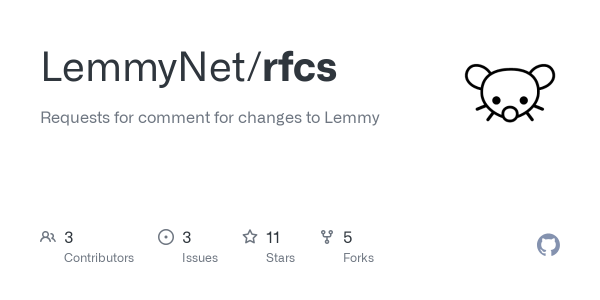A packed week; Switzerland joins the fediverse, discussions on how to organise the group responsible for the ActivityPub specification, thoughts and developments regarding Lemmy and governance and more! This week also saw major conversations on the feeds regarding blocklist, and especially The Bad Space, with discussions and allegations getting quite heated. I’ve decided to move my writeup of the situation towards next week; getting a bit of distance in time helps me with doing the situation justice.
Switzerland joins the fediverse
The Swiss government has officially launched their Mastodon server at social.admin.ch! In the press release (not available in English), they state that this is a pilot test that will run for one year. The server is intended for the Federal Council and the government departments.
Some departments that have already registered an account include the Department of Foreign Affairs, the Department of Home Affairs, and the Department for Economy, education and research. Swiss’ multilingual culture poses an interesting challenge; in which language will the accounts posts? The Department for Foreign Affairs maintain a separate account for English communication, with the other account posting in German, French and Italian. The spokesperson of the Swiss Government, André Simonazzi, also has an account, and posts in all four languages.
In the blog post announcing the new server, a few characters are listed as to why Mastodon is ‘fundamentally attractive for government communications’. They point out that decentralisation avoids the control of both an individual company and state censorship authorities. The privacy friendliness, and the transparency towards data is also mentioned as a positive.
For people who have been active on the fediverse for a while, this idea of freedom and independency is not new. What is striking however, is that we are seeing a shift towards governments also realising this. The value of digital autonomy for government entities is cannot be overstated enough.
Meanwhile, the Dutch government is actively working on their Mastodon pilot as well. In a post they echoed this sentiment of digital autonomy, adding that dependency on other platforms can harm public values. They also state that the goal of their Mastodon pilot is to get all (!) governmental organisations to be a part of it, reiterating that they are trying to find out if Mastodon can help the entire government (“de hele overheid”) reach their citizens.
The SWICG had a meeting about restructuring
The Social Web Incubator Community Group (SWICG) had a meeting this week, and one of the items that was being discussed is the potential restructuring of the group. This is a fairly relevant and important discussion, but the meaning of this might need some context: the W3C is the main organisation that is responsible for internet standards, such as ActivityPub, but many others as well. They can start Working Groups, who can produce official recommendations for internet standards. Between 2014 and 2018, the Social Web Working Group worked on the standards that power the fediverse, and in 2018 the W3C officially published the ActivityPub standard as a recommendation. The Working Group, having completed their recommendation, spun down, and started the Social Web Incubator Community Group, which maintains and coordinates work on the Social Web standards.
The main relevant difference between a Working Group and a Community Group, is that a members of a Working Group need to be either part of a organisation that is a (paid) member of the W3C, or be invited in as an Independent Expert. A Community Group is open to everyone. A Working Group can publish updates to the official documents, while a Community Group can only publish errata and clarifications.
The basic tradeoff can be summarised as follows: people feel that the standards as they are currently published need updates and work. This is hard to do with the mandate of a CG. Rechartering a WG enables more updates to the standards and protocols. This comes at the cost of openness however, as anyone can join a CG, and the ability to join a WG is significantly limited. As typically the criteria for being a member of a WG is to either be an employee of a W3C member organisation, or to be invited in as an Independent Expert, this might give participating organisations and companies more influence than independent fediverse developers.
The discussion on this will continue on Friday 22th (1300 UTC) with the next meeting of the SWICG.
Lemmy Governance and Beehaw doubts
Lemmy is working on making the process for changes more democratic, by adding RFCs. RFC stands for Request For Comments, and are meant to describe how major new features can be implemented in the software. By first explaining the potential changes, and allowing everyone to comment on them, more people can get involved in the process. Announcement here, directory here.
Meanwhile, the Lemmy server Beehaw.org is having doubts about continuing to use Lemmy. The Beehaw.org server is a Lemmy server with strong moderation standards that has been around. Ever since the new influx of users, they find that the moderation tools of Lemmy are too limited to properly deal with all the moderation work that needs to be done on posts and users that enter Beehaw via other, less well moderated, servers. They also list the lack of acknowledgement of the Lemmy developers on the seriousness of these issues as contributing to their hesitation to keep using Lemmy. A few weeks ago I reported on the issue of CSAM on Lemmy. The admin of Beehaw posted about the impact this had on their mental health, and by extension, on the urgency to look for a platform with better moderation tools. The Beehaw team expect that it will be in the order of months before a jump to a different platform is made.
WordPress and ActivityPub
The WordPress plugin for connecting a website to the fediverse via ActivityPub has officially launched in a 1.0 version. It comes with a variety of new features that further accentuate the social nature of connecting a blog to the fediverse. It allows you to follow the entire website now, instead of a singular author. It also gives you the option for an easy ‘follow me’ button, so that people can easily tell that the WordPress website is a part of the fediverse. Or showcase it with a ‘followers’ block.
The biggest news however, is that this plugin will soon also come to WordPress.com. So far, it is only available for people who do self-hosted versions of WordPress. The support for WordPress.com is “coming soon”, and will greatly expand the number of people who can make use this to connect their website to the fediverse.
For more detailed info, check out WPtavern’s blog about this. WeDistribute has an detailed guide on how to use the plugin, and use it to enable comments from across the fediverse on a WordPress blog.
The links
- Kbin creator Ernest gives a status update about the work on Kbin, as well as the amount of pressure the work brings.
- iOS app SoraSNS is already one of the more interesting fediverse apps in development, that supports a variety of platforms and has interesting ideas with algorithmic timelines. It now supports Bluesky as well.
- Bonfire is an interesting upcoming microblogging platform for the fediverse. They’ve announced that they are working towards 1.0 in the coming months.
- WriteFreely has not seen major updates recently, with updates and pull requests , and a PostFreely is a new fork that has started to been worked on.
Thank you for reading! If you want to receive this update every Sunday in your mailbox, subscribe below.
Subscribe to our newsletter!
#activitypub #fediverse #lemmy #mastodon
https://fediversereport.com/last-week-in-fediverse-episode-35/
Lemmy RFCs
We created a new repository for host requests for comment. It is based on the Rust RFC repo and meant to describe how major new features can be implemented. In this way more people can get involved in the discussion, without having to know Rust or getting lost in implementation details. If there is a major new feature you would like to see implemented, please consider writing an RFC first. Also feel free to suggest changes to the RFC process so that it works better for Lemmy.One RFC was already created a few weeks ago for supporting post tags. It should be added to the repo soon.
GitHub - LemmyNet/rfcs: Requests for comment for changes to Lemmy
Requests for comment for changes to Lemmy. Contribute to LemmyNet/rfcs development by creating an account on GitHub.GitHub
Meer overheidsorganisaties testen Mastodon - Digitale Overheid
De pilot voor de Mastodon-server van de overheid krijgt steeds meer deelnemers. Het doel is om alle overheidsorganisaties te betrekken.Eva Kloor (Digitale Overheid)


